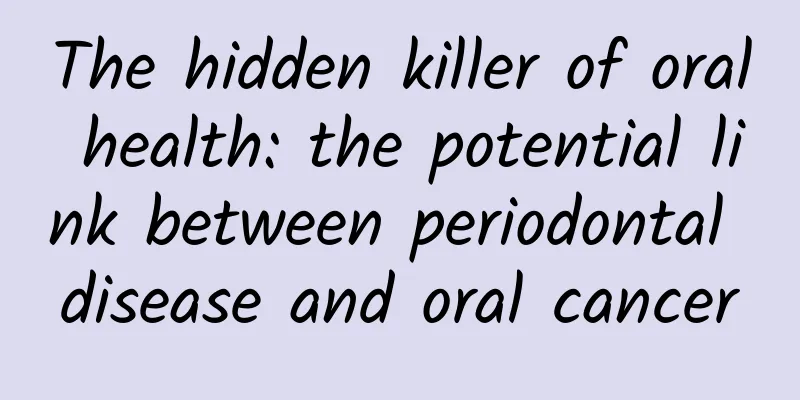The hidden killer of oral health: the potential link between periodontal disease and oral cancer

|
Author: Sun Ruiman, School of Stomatology, Huazhong University of Science and Technology, Postgraduate Science Lecture Team of the School of Stomatology, Huazhong University Photo: Liu Chao, Jianghan University School of Medicine Instructor: Yang Shengli Wuhan Union Hospital Oral cancer is a common malignant tumor of the head and neck, ranking sixth among all malignant tumors in the body, most of which are oral squamous cell carcinoma (OSCC). In recent years, a large number of studies have found that periodontitis is positively correlated with the risk of OSCC, and that periodontal pathogens (such as Porphyromonas gingivalis, Fusobacterium nucleatum, etc.) are closely related to oral squamous cell carcinoma. The risk of oral cancer in people with periodontitis is 2.66 times that of people without periodontitis. According to the fourth national oral health epidemiological survey conducted on September 19, 2017, the periodontal health rate of adults in my country is only 9.1%. Periodontal health should be taken seriously by clinicians and the general public. It is very important to popularize the knowledge about the correlation between periodontitis and OSCC to improve people's awareness of periodontal health. Why periodontitis promotes oral squamous cell carcinoma Periodontitis promotes the occurrence of OSCC mainly through the following two aspects: first, directly through microorganisms and their products, such as endotoxins and enzymes, directly acting on surrounding cells to promote the formation of OSCC; second, indirectly through long-term chronic inflammation, interfering with the host's immune response, forming a microenvironment that can promote cell growth, proliferation, metastasis, angiogenesis, and inhibit cell apoptosis, thereby promoting epithelial cell carcinogenesis and providing favorable conditions for the growth and metastasis of cancer cells. Effective measures to prevent periodontal inflammation from developing into oral cancer To prevent periodontal inflammation from developing into oral cancer, you can do the following in your daily life: 1. Maintain oral hygiene 1. Brush your teeth correctly: Brush your teeth at least twice a day, use fluoride toothpaste, and adopt the correct brushing method to effectively remove plaque on the surface of teeth. 2. Use dental floss: Use dental floss every day to clean between teeth and remove food debris and plaque in places that are difficult to reach by brushing. 3. Regular teeth cleaning: Have professional teeth cleaning every six months to a year to remove tartar and plaque that is difficult to remove by yourself. 2. Regular examination and treatment 1. Regular check-ups: Perform regular periodontal checkups to detect and address potential problems early, such as caries and poor restorations, to avoid long-term irritation to the oral mucosa that may lead to malignant changes. 2. Active treatment: Existing periodontal inflammation should be treated proactively to prevent further development. 3. Improve your lifestyle 1. Balanced diet: Maintain a balanced diet, reduce the intake of high-sugar foods, and reduce the growth environment of bacteria in the mouth. 2. Quit smoking and limit alcohol consumption: Smoking and excessive drinking are risk factors for periodontal disease and oral cancer. Quitting smoking and drinking in moderation can help maintain periodontal and oral health. 3. Avoid chewing betel nut: Betel nut is a first-class carcinogen. Chewing betel nut not only causes oral mucosal lesions, but also causes tooth wear. Long-term stimulation of the oral mucosa can lead to malignant changes. IV. Other preventive measures 1. Use antibacterial mouthwash: Choosing a good quality antibacterial mouthwash can help reduce the bacteria in the mouth. 2. Stay hydrated: Drinking enough water every day helps keep your mouth moist and reduces bacterial growth. 3. Avoid irritating foods: Reduce the intake of overly hot, hard or spicy foods to avoid damage to the oral mucosa. I hope everyone can improve their awareness of oral health, develop good living habits, detect and treat oral diseases in a timely manner, stay away from periodontitis and oral cancer, and have a good set of teeth! |
<<: #千万IP创科普# Something we have to say about lung disease: Silicosis is "pain that can breathe"
>>: Someone got poisoned after eating toads! Don't be greedy for these things →
Recommend
What are the effects of not having sex for a long time on women?
Sexual intercourse is not only an important part ...
Does small menstrual flow affect pregnancy?
There are many reasons for a small amount of mens...
Women have a lump in the right lower abdomen without pain
Modern women are under a lot of pressure as they ...
Can I swim while using a tampon?
Can I swim after using a tampon? This is a questi...
Reasons for first pregnancy arrest
For women, only when they have been pregnant and ...
One month pregnant, my appetite is very good
Because the fetus is in the process of implanting...
New local cases of COVID-19 infection in Beijing and health tips
From 0:00 to 24:00 on June 7, there were 7 new lo...
Menstruation is not red but dark
During menstruation, women will have vaginal blee...
What are the main reasons for thick and yellow leucorrhea?
Leucorrhea is a physiological tissue unique to wo...
9 questions and answers about cataracts
The elderly are the most susceptible to cataracts...
Let’s talk about “probiotics” and “prebiotics”
"Probiotics" and "prebiotics"...
How many days after the menstrual period is the safe period?
Many female friends only know that having sex dur...
Causes of benign breast lumps
Breast lumps are one of the most common diseases ...
Do pregnant women need to have leucorrhea examination?
Pregnant women need to undergo various examinatio...
What harm does pelvic inflammatory disease do to the body?
Pelvic inflammatory disease is a very serious gyn...









